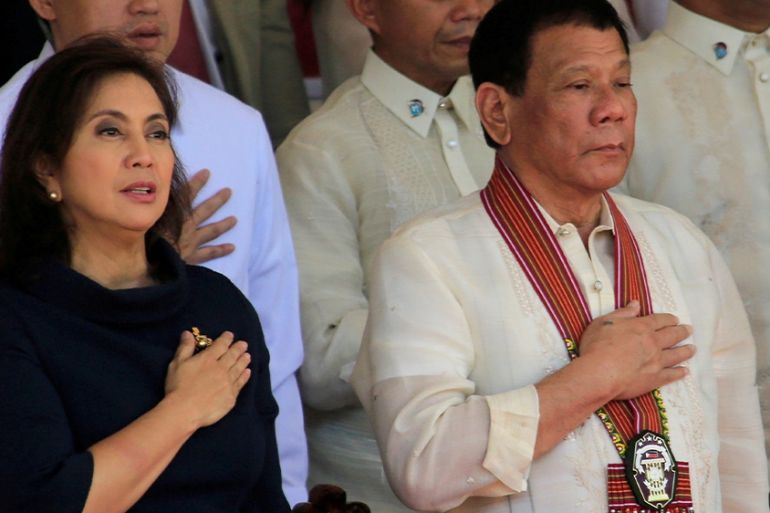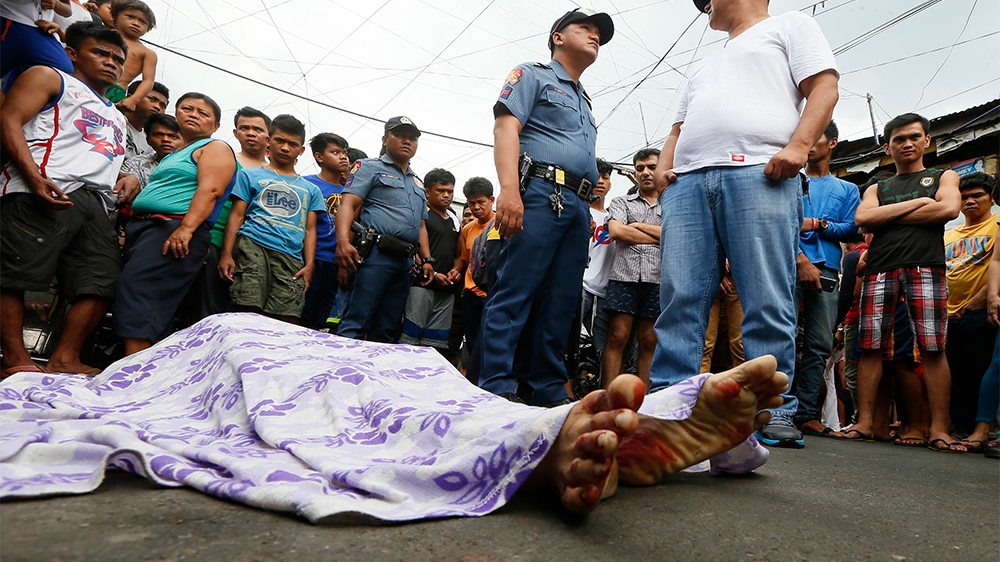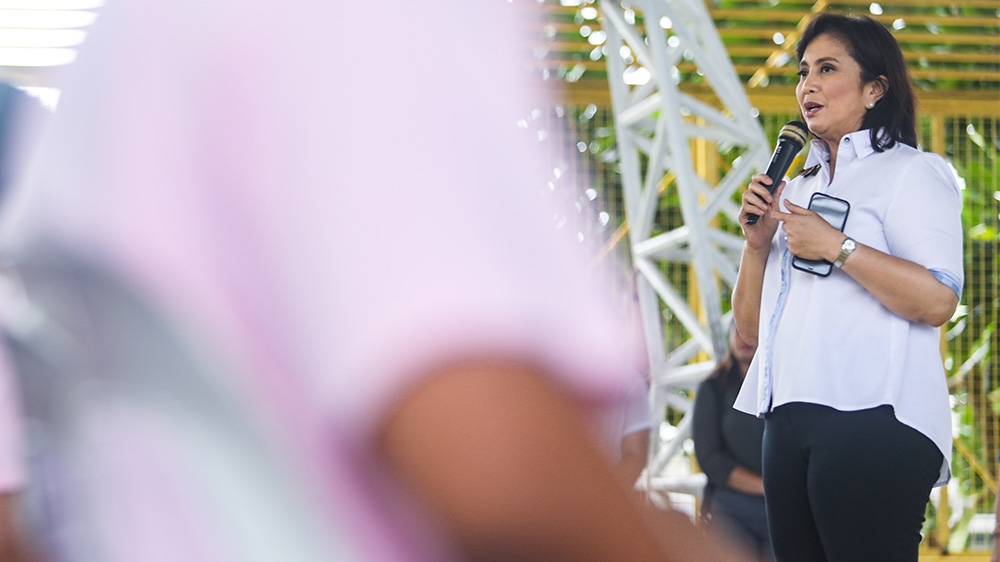‘Are you afraid?’: Philippines’ Robredo defiant over drugs war
Vice president says she remains determined to stop drug killings after Duterte sacked her from key post after 19 days.

Manila, Philippines – A day after she was stripped of her post as head of the Philippines’ anti-drugs council, Vice President Leni Robredo came out fighting.
“They may have taken away my position but they cannot take away my determination to stop the killings, hold the responsible to account and win the campaign against illegal drugs,” Robredo told the media.
Keep reading
list of 4 itemsEurope pledges to boost aid to Sudan on unwelcome war anniversary
Birth, death, escape: Three women’s struggle through Sudan’s war
Does Israel twist humanitarian law to justify Gaza carnage?
“If they think this is the end, they don’t know me very well. I am just beginning,” she added.
-
Philippine vice president and Duterte critic takes drug war post
-
‘Free to kill’: Duterte to newly appointed senior police officer
Robredo said she plans to reveal her findings from the 19 days she spent as one of two people leading ICAD, the inter-agency committee managing and coordinating the government’s centrepiece policy to crack down on illegal drugs.
“When I took on this post, I asked, ‘Are you ready for me?’ Now, my question is, ‘What are you afraid I will find out? What are you afraid the people will know?'”
‘Failure to present ideas’
President Rodrigo Duterte fired Robredo less than three weeks after he had appointed her to the job of running the agency.
Rights groups say at least 20,000 people have been killed in the crackdown and Robredo, who was elected to her post separately to Duterte and comes from an opposing party, has been among its fiercest critics.
In a statement, Presidential Spokesperson Salvador Panelo said Robredo was terminated because of her “failure to present ideas”.
|
|
But Robredo’s team says in the brief time she was in the post she met various government agencies, community leaders and religious groups, as well as visiting drug rehabilitation centres.
Philippine National Police (PNP) Spokesperson Bernard Banac confirmed that Robredo presented ICAD with recommendations on improving the conduct of drug operations.
“Her recommendations were viewed positively. We share the same objective of ensuring that police operations are transparent and compliant to the rule of law.”
Among her recommendations was that the police use body cameras during anti-drug raids.
“The use of body cameras were already part of the PNP’s plans back in 2017 to make sure that police operations are aligned with established procedures and that any lapses are addressed.”
Banac said that even though Robredo is no longer with ICAD, her recommendations will be reviewed and taken into consideration.
Scepticism
Many were sceptical about Duterte’s motives when he appointed Robredo as co-lead of ICAD on November 5.
Robredo had long made clear her opposition to the “war on drugs”, which critics say has targeted mostly poor small-time drug peddlers.
Duterte, meanwhile, has consistently criticised Robredo, mocking her performance and appearance, making it clear that he would rather have someone else as his vice president.
The president’s decision to remove Robredo from the ICAD role came days after she requested access to a list of big drug dealers. He refused, saying that she could not be trusted with classified information.

Robredo’s office said other agencies had been more cooperative.
“One positive thing that came out of all of this is the very collaborative welcome the vice president received from the various government offices she met with,” said Barry Gutierrez, Robredo’s spokesperson.
According to Gutierrez, the employees of the Dangerous Drugs Board applauded Robredo when she discussed more evidence-based approaches to the drug problem and shifting the focus from law enforcement to rehabilitation.
“These are professional civil servants. They appreciate the importance of gathering facts and evidence before drafting policies.”
But it was in the poor communities and among former drug users that Robredo found the warmest welcome.
“For the first time since the drug war began, a high ranking government official actually talked to them and asked them how they had been affected,” Gutierrez added.
‘She listened’
Father Flavie Villanueva runs a counselling and livelihood programme for the wives and widows of those who have died in drug-related killings.
A former drug user, the issue of rehabilitation is one close to his heart.
“VP Robredo didn’t come with ready solutions when she met with us. She listened first. When I was a user, that’s the kind of help I would have wanted for myself.”
Despite the obstacles, Nanette Castillo was hopeful that the vice president could reform the anti-drug campaign and seek justice for those who had lost loved ones.
Castillo’s son, Aldrin, was shot and killed by masked men on motorcycles on October 2, 2017. No one has been arrested for the crime.

“I felt hopeful when I heard her say she wanted to save lives,” the 51-year-old said. “I felt like the Vice President was standing up for me and for all of us who have lost loved ones. They underestimated her just because she’s a woman, just like they underestimate our fight for justice just because we are poor.”
Castillo is angry about the “political bullying” of Robredo but said she hopes it will jolt others into action.
“This just shows that the government was never serious about ending the drug-related killings. People need to wake up to this reality and do something about it.”
Risk of exposure
Political analyst Jose Antonio Custodio said the administration had lost its opportunity to use Robredo as a “deodoriser” to deflect the widespread international criticism of the drug war.
Human Rights Watch has called the drug war “the Philippines’ worst human rights crisis since the dictatorship of Ferdinand Marcos”.
In March 2017, the International Criminal Court announced it would begin a preliminary examination of the drug war, which prompted Duterte to withdraw the Philippines from the ICC.
In July, the UN’s Human Rights Council voted to begin an investigation of the Philippines’ “war on drugs” with its report due to be submitted by June next year.

“They never thought Robredo would take the offer. They’re afraid of the drug war being exposed for what it is: an organised mass killing of the poor. The slaughtering of more than 20,000 people requires guidance – all the way from the top,” Custodio added.
When Robredo does come out with her findings about the drug war, it may give the administration more ammunition for the sedition case it filed against Robredo and 36 other opposition leaders.
But she may decide she has nothing to lose.
“She is already a target of the sedition charges. She can go all the way as Duterte enters his twilight years in politics,” said political analyst Richard Heydarian.